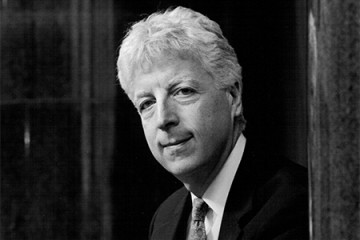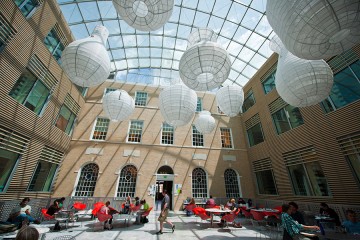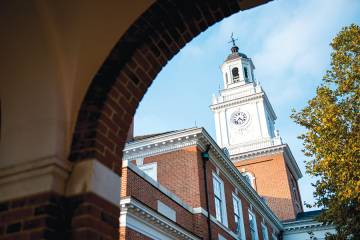In meetings across the Homewood campus, a role reversal is taking place: A team of faculty, administrators, and deans listen closely, dutifully taking notes, as students discuss their undergraduate experiences. At each meeting, coffee and refreshments are provided, and students grab a bite as they chat with the CUE2 representatives.
The faculty and administrators—led by Beverly Wendland, dean of the Krieger School of Arts and Sciences, and Ed Schlesinger, dean of the Whiting School of Engineering—are members of Johns Hopkins University's Second Commission on Undergraduate Education, or CUE2. The commission members, charged with developing a new model for undergraduate education at Johns Hopkins, have held these meetings, dubbed "Coffee with the Co-Chairs," to hear directly from students and ask questions about improving the overall learning experience at Johns Hopkins.
"We're grateful to the students and to the faculty who come to these meetings," Wendland says. "The CUE2 effort isn't only meant to improve the undergraduate experience for those who go to Hopkins now—it's for those who come after them as well."
The commission listening sessions have generated thoughtful discussions about a variety of aspects of the undergraduate experience at Johns Hopkins. On several occasions, students have expressed interest in fostering more interdisciplinary and cross-divisional opportunities for research and collaboration. Another frequent topic of discussion is the expectation of research—what undergraduate research looks like and how it can be improved, both in terms of quality and access. Students have also identified a need for more mental health resources and greater guidance on crucial academic decisions such as choosing a major and navigating a career path.
"These meetings have brought together student voices, faculty voices, and staff voices—we've had representation and input from across the community," Schlesinger says. "It's been a rewarding, as well as illuminating, experience that has helped shape my thinking and the thinking of the commission as we work to develop our vision and our ideas for undergraduate education."
When its work is complete, the commission's recommendations on research, community-based learning, teaching approaches, post-graduate planning, and other topics will shape the student experience for the future. As the commission moves toward its goal of publishing recommendations this fall, Janet Schreck, the assistant vice provost for education who has been the senior administrator for the commission, says she expects the listening sessions will also serve as an informal focus group, allowing the commission to propose plans and receive preliminary feedback.
"There will be more formal ways to give feedback later in the year, but these sessions are maybe a less intimidating, more conversational way to give feedback earlier in the process," she says. "We view the CUE2 process as being iterative—we didn't start out with a predetermined plan for improvement, and this way we get authentic, first-person feedback to help us understand where we can support students and improve their experience."
It's not too late to attend these informal meetings with the CUE2 team. The upcoming Coffee with the Co-Chairs events are:










